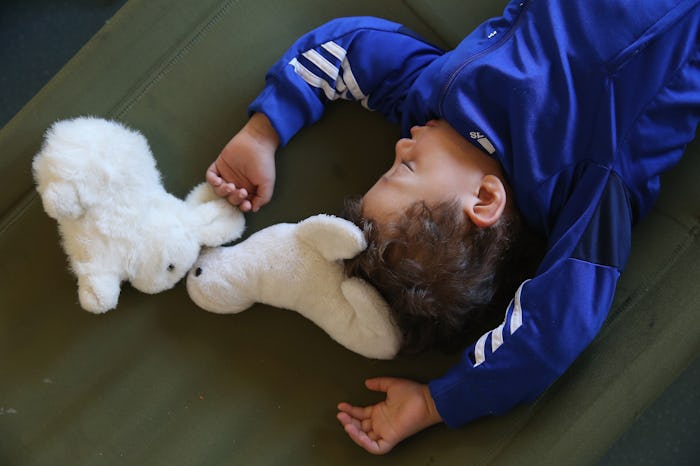Life

How To Adjust Your Toddler To Daylight Saving Time — Hint: Start Now
Getting a toddler to sleep on an average night is no picnic. But add daylight saving time into the equation and it can feel like a herculean task. While it can take months to lock in a sleep schedule, it only takes one stroke of the clock on daylight saving time to derail it. I feel a sense of dread already and we're still a few days out from having to "spring forward" (FYI, it happens at 2 a.m. EST, March 11). If you, too, are wondering how to adjust your toddler's sleep schedule for when daylight saving time starts, don't worry. There's an entire profession dedicated to this subject — they're called children's sleep consultants — who can guide us through these treacherous waters.
For my 3-year-old, an average night usually includes calls for more stories, more water, and more snuggles. But last night's claim was one of the more outlandish excuses I've heard, "I forgot how to get to my pillow. You need to come in and lift me to it." My husband and I had a good laugh at that one, but when we realized that daylight saving time (DST) was this weekend, we knew we really had to get our $h*t together! I saw my already-too-short sliver of "me" time going straight down the drain. So what can a parent do to beat DST at it's own game?
The key is to start to making incremental changes to your toddler's schedule a few days before the time shift, explained Daniel Lewin, Ph.D., associate director of sleep medicine at Children's National Health System in an interview with Parents. So, for example, if your child's bedtime is at 8:00 pm, move it up to 7:45, then 7:30 and so on so that his or her internal clock starts to adapt ahead of time, rather than expecting them to change by a full hour on DST. Simultaneously, start waking your child up earlier in the morning, which can be particularly effective for older kids who might fight the earlier bedtime, advised Dr. Lewin in the same article in Parents.
While that's a great strategy, some parents might not read (or heed) the advice in time to make incremental schedule adjustments. Fortunately, there are a few other hacks available for parents a little late to the daylight saving party. For starters, be mindful of light.
"As our days get longer so will the brightness at night. Make sure that you have those blackout shades pulled down to help get your child to sleep and help them sleep as long as possible" recommended Sleep Baby Love's Susie Parker who is certified through the Family Sleep Institute.
Additionally, unless your child is already an insanely early riser, you'll want to open those blackout shades in the morning to let the light in and help them wake up earlier. Yes, having them sleep an hour later than normal might feel like a win, but you'll pay for it at night when they're still bouncing off the walls at 9 p.m.
"In the morning, get your child in the light as much as possible. Natural sunlight is best, so if weather permits, have breakfast outside or have your child help walk the dog. If that's not an option, turn on the lights in the house so it's nice and bright, added Dr. Lewin in his interview with Parents.
The exception to this, of course, is the toddler that naturally rises at a truly ungodly hour (5:30 a.m., ughhh). In those cases, having him or her sleep an extra hour might be just fine. If you're using a tot clock to regulate when they can get out of bed, you can set it an hour later but "make sure that you set the expectations accordingly, since these tools will only work if you are consistent," advised Ms. Parker.
While DST might feel like a cruel joke on parents, take heart knowing it's only temporary. "Within a week (2 max) you should be past the signs of daylight savings time," added Ms. Parker. And then in 8 months you'll get to do it all over again.
Check out Romper's new video series, Bearing The Motherload, where disagreeing parents from different sides of an issue sit down with a mediator and talk about how to support (and not judge) each other’s parenting perspectives. New episodes air Mondays on Facebook.